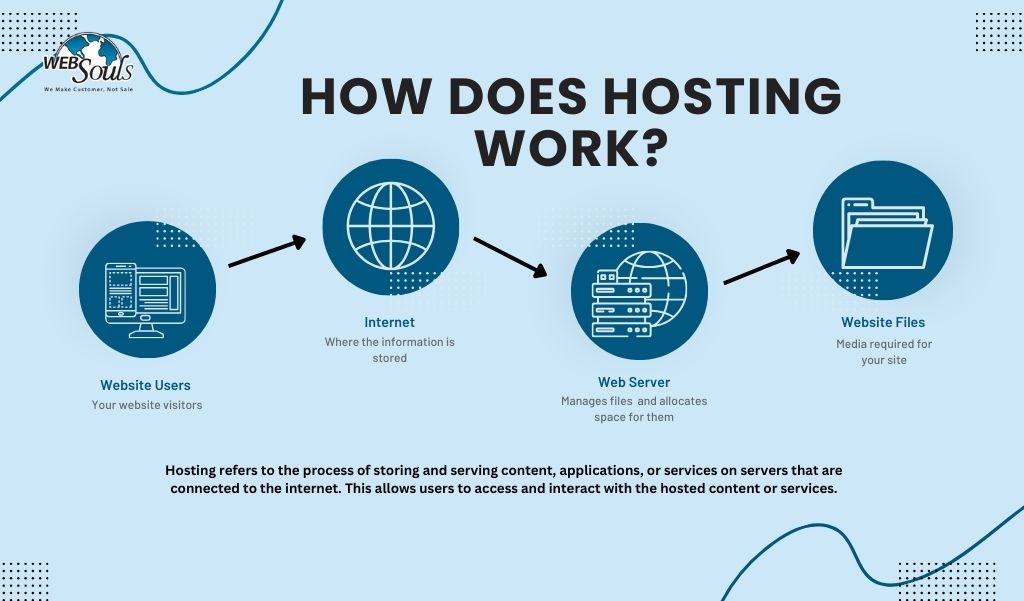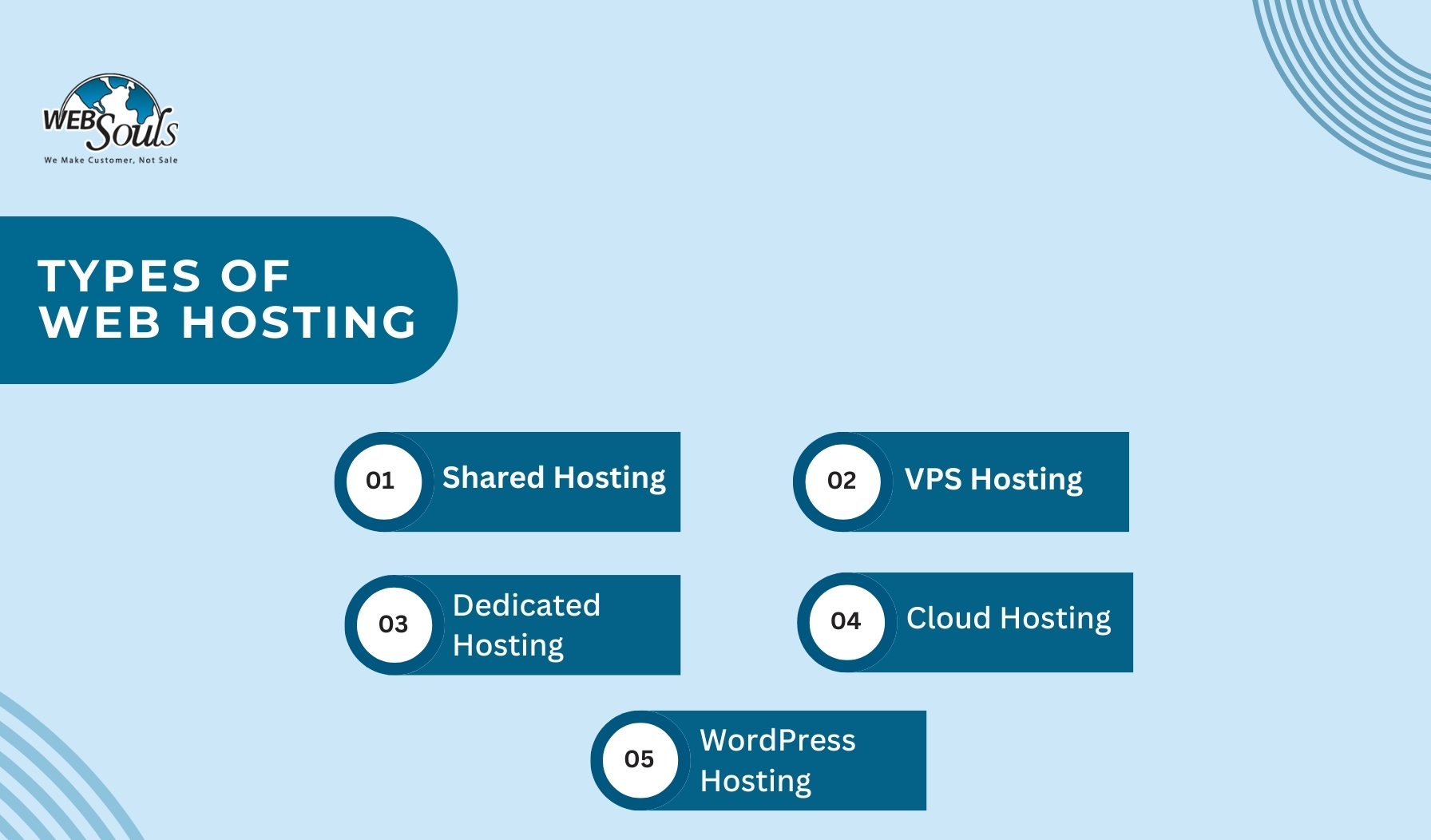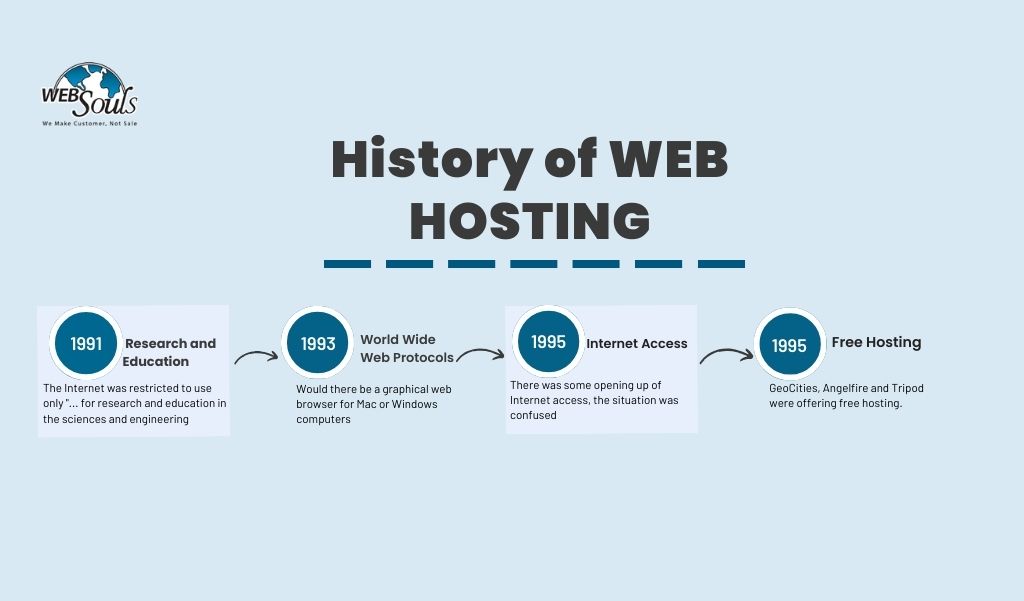Welcome to the diverse world of web hosting! In this guide, we're about to explain the fundamental elements of web hosting, making the digital world accessible to all. Whether you're just setting foot in the world of websites or seeking to optimize your online presence, this guide is your friendly companion on the journey to understanding and mastering web hosting.
From the smallest personal blogs to expansive e-commerce platforms and beyond, web hosting is the backbone of the online world. As we dig into this guide, we'll uncover the complexities and shades of web hosting in easy-to-follow language, ensuring that by the end, you'll not only comprehend the essentials but also feel confident navigating the digital landscape.
Together, we'll explore the historical roots, the nuts and bolts of web hosting, and the technical aspects of making decisions better. By the time you reach the end, you'll have a solid grasp of web hosting essentials, empowering you to make choices that resonate with your digital goals.
So, fasten your seatbelt as we get on this enlightening journey through the details of web hosting – your gateway to a successful online presence.
Let's dive in!
1. Introduction to Web Hosting
1. Definition of Web Hosting
Picture your website as a home in the digital area, and web hosting as the plot of land it sits on. web hosting is where your website lives, allowing it to be seen by people worldwide. It's like renting space on the internet to make your website accessible to everyone.
Why does it matter? Well, understanding web hosting is the first step in taking control of your online presence. Just like you choose a location for your home, selecting the right web hosting is crucial for your website's performance and success.
2. Importance of Web Hosting
Web Hosting is pivotal for the success of your online presence. Its significance can be highlighted through the following points:
Foundation of Accessibility: Web hosting ensures that your website is not only operational but also easily accessible to users. It lays the groundwork for a seamless user experience, allowing individuals to visit and explore your online storefront without any hindrance.
Reliability Matters: The right web hosting service provides reliability, guaranteeing that your website remains consistently available. This reliability is crucial for maintaining a positive reputation and preventing potential customers from encountering downtime or access issues.
Security Assurance: Web hosting plays a fundamental role in securing your online space. A robust hosting service implements security measures, safeguarding your website and sensitive data from cyber threats. This is essential for building trust among your visitors and protecting your online assets.
In essence, web hosting is not merely a technical requirement; it forms the cornerstone of a successful online venture, ensuring accessibility, reliability, and security for your digital storefront.
3. Historical Context of Web Hosting
Our journey of the history of web hosting takes us back to the early 1990s when the internet was still in its early stages. During this time, individuals and businesses were just starting to discover the vast possibilities of creating a digital presence. However, a significant challenge emerged – figuring out where and how to store the files that make up a website.
In this era, the concept of web hosting started to take shape. Early websites were hosted on individual computers, often belonging to the creator of the site. This method had limitations, particularly in terms of reliability and handling increased traffic.
As the demand for websites grew, new companies emerged to address this need. In the late 1990s, specialized web hosting providers became prominent, offering dedicated servers and infrastructure to support the expanding online landscape. This shift was a significant milestone, allowing businesses and individuals to concentrate on creating content and developing their websites without the hassle of managing server hardware.
The early 2000s witnessed the introduction of shared hosting, making web hosting more accessible and affordable for a broader audience. This innovation enabled multiple websites to share resources on the same server, reducing costs and making the digital space more accessible.
Fast forward to the present day, and we find a diverse ecosystem of web hosting services catering to various needs. From shared hosting for beginners to powerful dedicated servers and scalable cloud solutions for enterprises, the evolution of web hosting has been truly transformative.
Understanding this historical backdrop provides valuable insights into the challenges that shaped the web hosting industry. As we delve into the fundamentals of web hosting, we'll gain an appreciation for how these historical milestones laid the groundwork for the sophisticated hosting solutions available today.
2. Understanding Web Hosting Basics

1. What is Web Hosting?
Web hosting is like setting up a virtual home for your website in the big digital world. It's similar to renting a spot on the internet where all your website's stuff—files, pictures, and data—can hang out. Image it as grabbing a space on a computer, kind of like a powerful digital hub that's always connected to the internet.
In simpler terms, web hosting turns your website from just a bunch of digital files into something everyone, everywhere can check out. It's like giving your website a passport to the worldwide web! To break it down further, think of your website's domain as its address, and web hosting as the real estate where your site's content lives.
Choosing the right web hosting provider is like selecting the ideal neighborhood for your digital presence – a decision that profoundly impacts your website's visibility, performance, and overall success.
2. Explanation of Web Hosting
Beyond providing a space for your website to exist, web hosting ensures it remains secure, functional, and readily available to users. This includes protection against potential cyber threats, maintaining server infrastructure, and optimizing performance for a seamless user experience.
Web hosting is not a one-size-fits-all concept. Different hosting plans offer varying levels of resources, from shared hosting for smaller websites to dedicated hosting providing exclusive server access. It's crucial to align your hosting choice with your website's needs and growth potential.
Consider your website as a living entity, and web hosting as the ecosystem that sustains its digital life. The hosting provider becomes the agent, managing the technical details, leaving you free to focus on crafting content, engaging with users, and growing your online presence.
By understanding web hosting in this holistic manner, you empower yourself to make informed choices that resonate with your website's unique requirements. The journey of hosting your website becomes not just a technical necessity but a strategic decision shaping your digital identity.
3. Components of Web Hosting
Server:
A server, the essential cornerstone of web hosting, acts as a sophisticated digital nexus for your website. It orchestrates and propels all the vital components constituting your website – files, images, videos, and data. This digital space, consistently linked to the internet 24/7, operates as the central nervous system ensuring the global accessibility of your website. The server's sturdy infrastructure plays a pivotal role in the rapidity, dependability, and comprehensive functionality of your digital realm.
How a Server Works:
The functioning of a server involves intricate processes aimed at managing, storing, and delivering your website's content to users worldwide. When a user accesses your website, a request is sent to the server. The server, akin to a diligent librarian, fetches the requested information from its stored files and transmits it back to the user's device. This seamless exchange ensures that your website's content is efficiently delivered, contributing to a swift and responsive user experience.
Benefits of Having a Server:
Having a server offers a myriad of advantages for your digital presence. Firstly, it guarantees constant availability, allowing users to access your website at any time. The server's robust infrastructure enhances the speed at which content is delivered, contributing to a positive user experience. Moreover, a dedicated server provides heightened security, safeguarding your website and data from potential threats. The centralized nature of a server simplifies the management of website resources, promoting efficient updates and maintenance. Overall, the benefits of having a server extend to improved reliability, enhanced performance, and a seamless user interaction with your digital domain.
Domain Name System (DNS):
The Domain Name System (DNS), often regarded as the digital librarian of the vast internet repository, is a pivotal element. It meticulously manages an address book, guaranteeing that user-friendly domain names such as www.websouls.com seamlessly convert into the intricate IP addresses used by computers for precise location and connection. Essentially, DNS acts as a mediator between human-readable website names and the intricate numerical language governing the architecture of the internet. Its primary function is to ensure the seamless navigation and accessibility of your website.
How Domain Name System (DNS) Works:
The operation of the Domain Name System involves a systematic process that facilitates the translation of user-friendly domain names into the numeric language understood by computers. When a user enters a website name, the DNS server receives the request, searches its address book for the corresponding IP address, and returns this information to the user's device. This translation process allows the user's device to locate and connect to the specific server hosting the requested website. In essence, DNS acts as a translator, ensuring that users can easily navigate and access websites using familiar domain names.
Benefits of Domain Name System (DNS):
The Domain Name System (DNS) offers several key advantages for the efficient functioning of the internet. Firstly, it simplifies the user experience by enabling the use of human-readable domain names, eliminating the need for users to remember complex IP addresses. Additionally, DNS enhances the speed and efficiency of website access by swiftly translating domain names into IP addresses. The system's distributed nature contributes to improved reliability, ensuring that websites remain accessible even if one DNS server encounters issues. Overall, the benefits of the Domain Name System include user convenience, expedited access to websites, and a robust infrastructure that promotes the smooth functioning of the internet.
3. Web Servers and Data Centers:
Web Servers and Data Centers, the hidden machinery within the realm of web hosting, constitute a intricate phenomenon. These technological entities function as the central hub of hosting services, serving as the guardians of your website's data. These facilities provide the essential infrastructure, ensuring uninterrupted availability and steadfast reliability. Data centers, frequently equipped with state-of-the-art technology and security measures, form the backbone that sustains the seamless operation of web hosting services.
How Web Servers and Data Centers Work:
The operation of Web Servers and Data Centers involves a synchronized process aimed at managing, storing, and delivering the content of your website to users worldwide. Web servers, like diligent attendants, respond to user requests by retrieving and delivering the requested data. Simultaneously, data centers act as fortified repositories, securely storing and managing the vast amounts of data associated with numerous websites. The collaboration between these entities ensures continuous availability, reliability, and the efficient delivery of website content to users.
Benefits of Having Web Servers and Data Centers:
The incorporation of Web Servers and Data Centers into web hosting yields a multitude of advantages for website owners. Firstly, these entities ensure the continuous availability of websites, contributing to an uninterrupted user experience. The robust infrastructure enhances the speed at which website content is delivered, optimizing user satisfaction. Additionally, the centralized management of data within data centers simplifies website resource management, facilitating efficient updates and maintenance. The integration of cutting-edge technology and security measures in data centers ensures the safeguarding of website data against potential threats. In summary, the benefits of having Web Servers and Data Centers encompass improved reliability, enhanced performance, and secure data management for a seamless web hosting experience.
4. HTTP and HTTPS Protocols:
HTTP (Hypertext Transfer Protocol) and its robust companion, HTTPS, unfold in the intricate language of web communication. They serve as the ambassadors orchestrating the dialogue between your browser and the server. Present them as the custodians of secure and efficient information exchange, ensuring that every interaction between the user and the website takes place within a safeguarded digital environment. HTTPS, with its additional layer of security through encryption, evolves into the vigilant shield safeguarding sensitive data, fostering trust, and enhancing the overall user experience.
How HTTP and HTTPS Protocols Work:
The operation of HTTP and HTTPS Protocols involves orchestrating a secure and efficient exchange of information between a user's browser and the website's server. When a user interacts with a website, these protocols facilitate the communication by transmitting requests and responses. HTTP, the foundational protocol, enables the transfer of hypertext, while HTTPS adds a layer of encryption to secure the transmitted data. This encryption ensures that sensitive information, such as personal details and passwords, remains confidential during transmission. The diligent interplay of these protocols guarantees a protected digital interaction, promoting user privacy and data security.
Benefits of HTTP and HTTPS Protocols:
The adoption of HTTP and HTTPS Protocols presents numerous advantages for websites and users alike. Firstly, these protocols ensure the secure transmission of data, protecting sensitive information from unauthorized access or interception. HTTPS, with its encryption layer, establishes a secure connection, safeguarding user trust and fostering a positive online experience. Additionally, the use of these protocols contributes to improved search engine rankings, as search engines prioritize secure websites. Overall, the benefits include enhanced security, user trust, and a positive impact on the website's visibility and performance in the digital landscape.
These components intricately form the basics of web hosting, transforming it from a mere technical concept into a dynamic ecosystem where your website not only exists but flourishes.
3. Types of Web Hosting Services

Shared Hosting:
Shared Hosting is a hosting model wherein multiple websites share a single server and its associated resources, such as space, bandwidth, and processing power. In this collaborative arrangement, websites cohabit on the same server, each allocated a share of the available resources. This shared infrastructure allows for a cost-effective solution, making it particularly well-suited for smaller websites or those with lighter traffic loads.
Shared Hosting is similar to residing in a bustling digital apartment building within the online neighborhood. Each website operates independently, yet they collectively leverage the shared server's capabilities. While it provides a budget-friendly hosting option, it's essential to note that the performance of one website can potentially impact others on the same server. Despite this, Shared Hosting remains a popular choice for entry-level websites, blogs, and businesses seeking an affordable and accessible hosting solution. Synonyms: Mutual Hosting, Co-shared Hosting, Joint Hosting.
Virtual Private Server (VPS) Hosting:
Virtual Private Server (VPS) Hosting emerges as a personalized sanctuary in the digital landscape, evolving from the concept of shared hosting. Picture it as securing your very own command center—a digital space offering an enriched reservoir of resources and heightened control. In this setting, your website benefits from an exclusive portion of the server's capabilities, striking a delicate equilibrium between affordability and customization.
VPS Hosting is a sophisticated hosting solution that provides users with a dedicated virtual environment within a shared server infrastructure. This ensures a level of independence and flexibility beyond what shared hosting can offer. Each virtual server operates as an isolated entity, with its own operating system, resources, and configurations, contributing to enhanced performance and reliability.
This hosting model is like having a tailored digital oasis, meticulously crafted to align with your specific needs and preferences. VPS Hosting is an excellent choice for businesses and websites that have outgrown shared hosting but may not require the extensive resources and cost associated with a dedicated server. Synonyms: Personalized Server Hosting, Virtual Dedicated Hosting, Private Virtual Hosting.
While VPS Hosting offers greater customization and control, users should be mindful of managing their allocated resources efficiently. It stands as a versatile and scalable option, accommodating the evolving needs of websites as they grow and demand more robust hosting solutions.
Dedicated Hosting:
Dedicated Hosting is defined as an epitome of exclusivity within the digital world. In this case, your website receives VIP treatment by residing on its own dedicated server. This arrangement grants unparalleled control, an abundance of resources, and extensive customization options. It's comparable to owning a private estate in the expansive digital landscape – an autonomous space where your website not only thrives but also operates independently, free from resource-sharing with other entities.
This hosting model represents the body of digital luxury, tailor-made for websites with significant traffic and intricate functionalities. Dedicated Hosting ensures that your website's performance remains unaffected by the activities of other websites, contributing to enhanced reliability and stability.
While Dedicated Hosting comes with a premium cost, the benefits are manifold. The isolation from other users on the server ensures a consistent and reliable performance, making it ideal for high-traffic websites, e-commerce platforms, and applications with demanding resource requirements. Additionally, the extensive customization options allow users to fine-tune server configurations to meet the specific needs of their website.
It's important to consider Dedicated Hosting when anticipating substantial growth or when dealing with mission-critical applications that demand the utmost reliability and security. The dedicated server becomes a digital fortress, safeguarding your website's data and ensuring optimal performance even during traffic spikes.
Cloud Hosting:
Cloud Hosting invites your website to ascend within the digital clouds, marking a departure from traditional hosting models. This innovative approach harnesses resources not from a solitary server but from a dynamic network of interconnected servers. The allure of Cloud Hosting resides in its innate scalability, flexibility, and unwavering reliability. This hosting paradigm seamlessly adapts to fluctuating traffic, ensuring your website glides gracefully even during traffic peaks.
The essence of Cloud Hosting is akin to operating in a dynamic and ever-responsive environment, where your website harnesses the collective power of multiple servers in the cloud. Synonyms: Cloud-Based Hosting, Networked Hosting, Cluster Hosting.
Cloud Hosting operates on a pay-as-you-go model, allowing users to scale resources up or down based on demand. This flexibility makes it an ideal solution for businesses and websites experiencing variable traffic patterns or anticipating growth. In this setup, the interconnected servers work collaboratively, distributing the load efficiently and enhancing overall performance.
The distributed nature of Cloud Hosting contributes to its reliability, as the failure of one server does not cripple the entire system. This redundancy ensures continuous availability, reducing the risk of downtime. Additionally, Cloud Hosting often integrates advanced security measures, safeguarding your data within the cloud infrastructure.
As a comprehensive hosting solution, Cloud Hosting aligns with modern technological trends, offering a robust and scalable environment for websites and applications of varying sizes and complexities.
WordPress Hosting:
WordPress Hosting is exactly crafted for enthusiasts of the popular content management system, offering a tailored environment for WordPress-powered websites. This specialized hosting goes beyond generic solutions, focusing on optimizing performance, enhancing security, and seamlessly integrating features to elevate the overall WordPress experience. It is akin to having a dedicated helper service for your WordPress site, ensuring it operates smoothly with a keen focus on the unique requirements of this widely-used content management system.
This WP hosting option acknowledges the specific needs of WordPress sites, providing an environment finely tuned for their requirements. It often includes automatic updates for the WordPress core and plugins, optimizing the site's functionality and security. The server configurations are optimized to support the dynamic nature of WordPress websites, ensuring swift loading times and efficient handling of content.
WordPress Hosting is particularly beneficial for users who prioritize user-friendly interfaces and seamless management of their WordPress websites. It streamlines tasks such as plugin installations, backups, and updates, allowing users to focus on creating and curating content without delving into the intricacies of server management.
The security features integrated into WordPress Hosting add an extra layer of protection against potential vulnerabilities, safeguarding both the website and its data. This hosting solution caters to a diverse audience, from individual bloggers to businesses relying on WordPress for their online presence, providing a reliable and optimized platform for WordPress enthusiasts.
These varied hosting options cater to the diverse needs of websites, offering a spectrum of choices from shared living to exclusive estates, and from dynamic cloud environments to specialized WordPress havens.
4. Selecting the Right Web Hosting Provider
Choosing the perfect web hosting provider is a crucial decision that can significantly impact your online journey. It's like to selecting a reliable partner for your digital endeavors – someone who not only understands but actively supports the unique needs and growth of your website. Here are key considerations to guide you through this crucial process:
1. Benefits of Having Web Hosting:
a. Reliability and Uptime Commitment:
When picking a hosting provider, think of it like choosing a foundation for your digital space. Make sure the provider not only promises but actually delivers on keeping your website up and running. This is crucial for a good user experience and to avoid any interruptions in your online presence.
b. Tech Support:
Dealing with digital stuff can be tricky. Look for web hosting providers known for having a helpful and knowledgeable support team. These are like your digital heroes, ready to assist you whenever you face technical challenges. It helps you solve problems quickly and keep your online presence smooth.
c. Digital Security:
In the online world, keeping your stuff safe is super important. Pick a hosting provider that comes with strong security features, like powerful walls, a watchful eye for detecting harmful software, and regular updates for extra protection. This digital fortress shields your website and the important information it holds from potential online threats.
d. Customized Hosting Experience:
Just like clothes tailored to fit you perfectly, your website needs hosting that suits it just right. Choose a hosting provider that lets you customize things, making hosting services fit your website's unique needs. This personal touch ensures everything works well together, matching your website's individual style.
e. Growing Together Smoothly:
Think of your online presence like a music piece. As it gets bigger, it should still sound smooth and good. Pick a hosting provider that allows your website to grow effortlessly. Choose plans that can easily handle more visitors and content as your website gets bigger. This ensures your hosting keeps up with the growth of your online world, making everything run smoothly.
2. Key Features to Look for in a Web Hosting Provider:
a. Bandwidth and Storage Limits:
Ensure your hosting plan provides ample bandwidth and storage to accommodate your website's needs. Sufficient resources contribute to smooth website performance, even during periods of increased visitor traffic.
b. Control Panel Options:
A user-friendly control panel simplifies website management. Look for hosting providers offering intuitive interfaces such as cPanel or Plesk. An easy-to-navigate control panel empowers you to efficiently control and monitor your hosting environment.
c. Backup and Restore Options:
Regular backups are your safety net in case of unforeseen events. Choose a hosting provider that provides reliable backup options, allowing you to restore your website quickly in the event of data loss or other emergencies.
d. Email Hosting:
If email communication is integral to your online presence, check if the hosting plan includes robust email hosting features. This ensures seamless integration between your website and email services, contributing to a unified online presence.
e. E-commerce Support:
If you operate an online store, ensure your hosting provider supports e-commerce features. Look for compatibility with popular e-commerce platforms and options for SSL certificates to secure online transactions.
3. Differences Between Linux and Windows Hosting:
| Criteria | Linux Hosting | Windows Hosting |
|---|---|---|
| Operating System Considerations | Linux hosting is widely preferred for websites using open-source technologies like PHP. | Windows hosting is suitable for websites using Microsoft technologies such as ASP.NET. |
| Software Compatibility | Linux hosting may have better compatibility with open-source software and applications. | Windows hosting is designed to work seamlessly with Microsoft-specific software and applications. |
| Performance and Security | Linux hosting is often known for its stability, speed, and reliability, making it a solid choice for various websites. | Windows hosting provides robust performance and security, with features tailored to Microsoft technologies. Ensure your choice aligns with your website's specific requirements. |
| Cost Considerations | Linux hosting is typically more cost-effective, with many open-source tools available at no additional cost. | Windows hosting may involve licensing fees for certain software, potentially impacting overall hosting costs. Consider your budget and required software. |
| Flexibility and Control | Linux hosting offers more flexibility and control for advanced users who prefer command-line interfaces and customization. | Windows hosting provides a user-friendly environment, making it accessible for users who prefer graphical interfaces. Consider the level of control and customization needed for your website. |
| Database Options | Linux hosting commonly supports databases like MySQL, PostgreSQL, and SQLite. | Windows hosting integrates seamlessly with Microsoft SQL Server and Access databases. Verify database compatibility based on your website's requirements. |
| Development Tools | Linux hosting is well-suited for developers using tools like Git and SSH for version control and secure connections. | Windows hosting is compatible with Visual Studio and other Microsoft development tools, offering an integrated development environment (IDE). Choose based on your preferred development workflow. |
5. Optimizing Web Hosting Performance:
1. Tips for Improving Website Speed:
Enhancing your website's speed contributes to a positive user experience and can positively impact search engine rankings. Implement strategies such as optimizing images, leveraging content delivery networks (CDNs), and minimizing HTTP requests to improve website speed.
a. Content Delivery Networks (CDNs):
CDNs distribute your website's content across servers worldwide, reducing load times for users. Integrating a CDN into your hosting strategy enhances global accessibility and ensures faster content delivery, particularly for users geographically distant from your server.
b. Image Optimization:
Compress and optimize images to reduce file sizes without compromising quality. This not only enhances website speed but also conserves bandwidth. Image optimization is particularly crucial for websites with a significant visual component.
c. Caching Techniques:
Implement caching mechanisms to store frequently accessed data, reducing the need for repeated requests to the server. Caching improves load times and overall website performance. Utilize browser caching and server-side caching to streamline the delivery of content to users.
d. Minimizing HTTP Requests:
Reduce the number of elements on a webpage requiring separate HTTP requests. Combining files, minimizing scripts, and leveraging browser caching contribute to a more streamlined user experience. A leaner website structure positively impacts both speed and overall performance.
2. Security Measures in Web Hosting:
a. SSL Certificates:
Security is a paramount consideration in web hosting, ensuring the safeguarding of sensitive user information and the overall integrity of a website. One crucial aspect is the implementation of Secure Socket Layer (SSL) certificates. These certificates play a vital role in encrypting data exchanged between the user's browser and the server. For websites handling confidential information like login credentials or financial transactions, SSL enhances security by preventing unauthorized access to sensitive data. When choosing a hosting provider, it is imperative to verify if they offer free or affordable SSL certificate options, as this can significantly contribute to the overall security posture of your website. Beyond SSL certificates, comprehensive security measures should be explored to protect against potential cyber threats and ensure a robust hosting environment.
b. Firewalls and DDoS Protection:
Security measures in web hosting extend to robust defenses against unauthorized access and malicious attacks. Firewalls act as virtual barriers, shielding your website from unauthorized entry, while Distributed Denial of Service (DDoS) protection safeguards against attempts to overwhelm your online presence. It is essential to select a hosting provider that prioritizes and integrates these security features, ensuring a resilient defense against evolving cyber threats.
c. Regular Software Updates:
Staying ahead of potential vulnerabilities is a proactive stance in web security. Regular software updates within your hosting environment, including server software, plugins, and essential applications, are crucial. Beyond enhancing website performance, these updates address security vulnerabilities, collectively fortifying the overall security posture of your website.
d. Secure File Transfer Protocols:
When it comes to transferring data, the choice of protocols matters for security. Utilizing secure file transfer protocols like SFTP (Secure File Transfer Protocol) adds an extra layer of protection during file uploads and downloads. This becomes particularly significant when handling sensitive data, providing a secure pathway between your computer and the hosting server. Choosing a hosting provider that emphasizes the use of secure file transfer protocols contributes to an enhanced level of protection against potential breaches.
6. Additional Considerations in Web Hosting:
1. Domain Name Extensions and Their Impact on Hosting:
The choice of domain name extension can impact your website's visibility and audience targeting. Consider factors such as the relevance of domain extensions to your content, the geographic targeting associated with certain extensions, and the overall branding implications.
a. Popular Domain Extensions:
Explore the variety of domain extensions available, including familiar ones like .com, .net, and .org, as well as newer extensions catering to specific industries or interests. Choose a domain extension that aligns with your website's purpose and enhances its online identity.
b. Geographic TLDs (gTLDs):
Geographic top-level domains (gTLDs) can be a strategic choice for businesses targeting specific regions or countries. Consider using country-code TLDs (ccTLDs) to signal local relevance and enhance your website's visibility in regional search results.
c. Specialty TLDs:
Specialty TLDs cater to specific industries or interests. Consider whether a niche-specific domain extension aligns with your website's content or purpose. Specialty TLDs can contribute to a memorable and relevant online identity.
2. Cost of Web Hosting:
a. Pricing Models (Shared, VPS, Dedicated, Cloud):
Different hosting models come with varying pricing structures. Understand the pricing models associated with shared hosting, VPS hosting, dedicated hosting, and cloud hosting. Evaluate which model aligns with your budget and meets your website's requirements.
b. Additional Costs and Hidden Fees:
Be aware of potential additional costs and hidden fees associated with hosting plans. These may include charges for exceeding bandwidth limits, additional services, or premium features. A transparent pricing structure ensures you can budget effectively for your hosting expenses.
c. Value for Money Considerations:
Assess the overall value for money offered by a hosting provider. Consider not only the cost but also the features, performance, and support provided. A hosting plan that offers a balance of affordability and quality ensures you get the best value for your investment.
3. Connecting a Domain Name with Web Hosting:
a. Domain Registration:
Start by registering your chosen domain name with a reputable domain registrar. Ensure you have ownership and control over your domain, as it serves as the unique address for your website.
b. Name Servers Configuration:
Configure the name servers associated with your domain to point to your hosting provider. This step establishes the connection between your domain and the hosting server, enabling visitors to reach your website using your domain name.
c. DNS Settings:
Understand and configure DNS settings for your domain. This includes mapping domain names to specific IP addresses, setting up subdomains, and managing other DNS records. Proper DNS configuration ensures seamless communication between your domain and hosting server.
4. Changing Your Web Hosting Service:
a. Reasons for Switching:
Consider the reasons for switching your web hosting service. Common reasons include dissatisfaction with current performance, a need for additional features, or a desire to explore more cost-effective options. Clearly identify your motivations for a smooth transition.
b. Preparing for Migration:
Before making the switch, prepare your website and data for migration. Back up your website, databases, and any essential files. Take note of custom configurations or settings that need to be replicated in the new hosting environment.
c. Step-by-Step Process:
Follow a structured step-by-step process for migrating your website. This includes transferring files, databases, and configurations to the new hosting server. Ensure that your website remains accessible throughout the migration process to minimize downtime.
d. Post-Migration Checks:
After migration, conduct thorough checks to ensure all website functionalities are intact. Test different pages, forms, and interactive elements. Monitor website performance to identify and address any issues promptly.
7. Advanced Considerations in Web Hosting
Now, let's explore more advanced aspects of web hosting to ensure a comprehensive understanding:
1. Understanding Server Resource Allocation:
a. CPU, RAM, and Disk Space Allocation:
Delve into the specifics of resource allocation. CPU (Central Processing Unit), RAM (Random Access Memory), and disk space are vital resources. Understand how your hosting plan allocates and manages these resources based on your website's requirements.
b. Monitoring Resource Usage:
Opt for hosting providers that offer tools to monitor resource usage. This allows you to track how your website utilizes CPU, RAM, and disk space, ensuring optimal performance and preemptive measures for potential issues.
c. Upgrading Resources as Your Website Grows:
As your website expands, so do its resource needs. Choose a hosting plan that facilitates seamless resource upgrades. This scalability ensures your website can handle increased traffic and data without compromising performance.
2. Web Hosting and SEO:
a. Server Location and SEO:
The geographical location of your hosting server can impact your website's SEO performance. Opt for a server location that aligns with your target audience to enhance website speed and user experience.
b. Website Speed and Search Rankings:
Search engines prioritize fast-loading websites. Implement strategies discussed earlier, like optimizing images and leveraging CDNs, to improve website speed, which can positively influence search engine rankings.
c. SSL Certificates and Google's Ranking Factors:
Google considers secure websites a ranking factor. Ensure your hosting plan supports SSL certificates, enhancing security and potentially boosting your website's visibility in search results.
3. Backing Up Your Website on Your Hosting:
a. Importance of Regular Backups:
Regular backups are your website's insurance policy. Choose a hosting provider that offers automated backup solutions to protect your data from accidental loss or cyber threats.
b. Manual and Automated Backup Solutions:
Understand the backup options available. Some hosting providers offer both manual and automated backup solutions, providing flexibility based on your preferences and needs.
c. Off-Site Backup Options:
Consider hosting providers that offer off-site backup options. Storing backups in a separate location adds an extra layer of security, ensuring data recovery even in the event of server issues.
4. Choosing the Right CMS for Your Hosting:
a. WordPress, Joomla, Drupal, and Others:
If your website is built on a Content Management System (CMS), ensure your hosting plan aligns with its requirements. Popular CMS options include WordPress, Joomla, and Drupal. Choose a host that provides optimal support for your CMS of choice.
b. Compatibility and Support from Hosting Providers:
Hosting providers may offer specialized support for specific CMS platforms. Verify compatibility and check for additional features or tools that enhance the performance of your chosen CMS.
5. Scalability and Future-Proofing Your Hosting:
a. Assessing Your Website's Growth Potential:
Anticipate your website's future needs. Assess factors like potential increases in traffic, additional features, or expansions in content. Choose a hosting plan that accommodates your website's growth.
b. Upgrading Hosting Plans:
Understand the process of upgrading hosting plans. Ensure your provider offers straightforward and efficient ways to upgrade, minimizing downtime and simplifying the transition as your website evolves.
c. Cloud Hosting for Enhanced Scalability:
Consider cloud hosting for unparalleled scalability. Cloud hosting allows you to scale resources dynamically, adapting to changing demands without the limitations of traditional hosting plans.
8. Web Hosting Decision-Making
1. What to Consider Before Buying Web Hosting:
Navigating the landscape of web hosting requires a nuanced understanding of the intricate factors that shape the success and efficiency of your website. Delving into the decision-making process involves a comprehensive exploration of key considerations:
a. Assessing Your Website's Needs:
Begin by conducting a thorough analysis of your website's unique requirements. Consider the nature of your content, the anticipated traffic volumes, and any specialized features or applications your website may demand. This foundational understanding is instrumental in tailoring your hosting choice to the specific needs and aspirations of your digital presence.
b. Technical Requirements:
Analyze the technical specifications of your hosting plan, ensuring a seamless integration with your website's technology stack. Verify compatibility with essential programming languages, databases, and server configurations critical for your website's functionality. A meticulous evaluation at this stage mitigates potential technical challenges and ensures a smooth operational journey.
c. Customer Reviews and Reputation:
Venture into the world of customer reviews to glean insights into the hosting provider's performance and reliability. Seek testimonials from users with similar hosting needs to yours. This qualitative exploration provides a nuanced understanding of the provider's track record, the quality of customer support, and the overall satisfaction levels of users facing comparable demands.
d. Support and Service Level Agreements (SLAs):
Exceptional customer support is the backbone of a reliable hosting service. Prioritize providers with a robust support system. Delve into Service Level Agreements (SLAs) to ascertain commitments related to uptime guarantees, support response times, and the provider's approach to issue resolution. A dependable support structure ensures that assistance is readily available when navigating the complexities of web hosting.
e. Scalability and Upgrade Options:
In the dynamic digital landscape, flexibility is paramount. Choose a hosting plan designed for easy scalability. Explore the options available for upgrading resources, ensuring your hosting solution can seamlessly adapt to the evolving demands of your website, whether it involves accommodating a surge in traffic or integrating additional features.
f. Contract Terms and Money-Back Guarantees:
Thoroughly analyze the nuances of contract terms. Inquire about money-back guarantees, understand the duration of the contract, and familiarize yourself with renewal policies. This diligence brings transparency to the financial aspects of your hosting commitment, providing the clarity needed to make an informed decision with confidence. The exploration of these considerations forms the bedrock of a strategic and well-informed web hosting decision-making process.
9. Conclusion
1. Recap of Key Points:
Summing up, web hosting is the backbone of your online presence, influencing your website's performance, security, and scalability. From understanding the basics to navigating advanced considerations, your choice of hosting provider plays a pivotal role in your digital journey.
Considering your hosting needs, WebSouls emerges as a distinguished player in the web hosting industry. Established in 2002, WebSouls has evolved into a best hosting company with a robust portfolio of services. From domain registration to web hosting, VPS, dedicated servers, and proficient website development, We offers a comprehensive suite of solutions to cater to your diverse requirements.
2. Future Trends in Web Hosting:
The future of web hosting holds exciting developments, driven by advancements in technology, changing user expectations, and the evolving digital landscape. Staying attuned to these emerging trends is essential for businesses and individuals seeking to optimize their online presence. Let's delve into the key future trends in web hosting:
Edge Computing Integration:
What: Edge computing involves processing data closer to the source of generation, reducing latency and improving performance.
Why: With the rise of real-time applications, IoT devices, and content delivery networks (CDNs), integrating edge computing into web hosting enhances speed, reliability, and overall user experience.
Cloud-Native Hosting:
What: Cloud-native hosting leverages cloud infrastructure to build, deploy, and scale applications seamlessly.
Why: Cloud-native architectures offer flexibility, scalability, and efficient resource utilization. Containers, microservices, and serverless computing become integral components of hosting solutions, optimizing performance and resource allocation.
AI and Automation in Server Management:
What: Artificial Intelligence (AI) and automation streamline server management tasks, predictive maintenance, and security protocols.
Why: Automating routine tasks allows hosting providers to enhance efficiency, reduce downtime, and proactively address potential issues. AI-driven insights enable better resource optimization and performance monitoring.
Green Hosting Practices:
What: Environmentally conscious hosting solutions prioritize sustainability and energy efficiency.
Why: As environmental concerns grow, hosting providers are adopting green practices such as renewable energy usage, energy-efficient hardware, and carbon offset programs. Businesses and consumers increasingly favor eco-friendly hosting options.
Decentralized and Blockchain-Based Hosting:
What: Decentralized hosting utilizes a network of distributed nodes, and blockchain ensures secure and transparent transactions.
Why: Decentralized hosting offers increased security, resilience against DDoS attacks, and censorship-resistant solutions. Blockchain ensures data integrity and transparent hosting transactions.
5G-Powered Hosting:
What: The rollout of 5G technology accelerates data transfer speeds and connectivity.
Why: Faster and more reliable internet connectivity enhances the performance of hosted applications and websites. 5G facilitates seamless user experiences, particularly for bandwidth-intensive content.
Serverless Architecture Adoption:
What: Serverless architecture allows developers to build and run applications without managing servers.
Why: This trend reduces infrastructure complexity, scales automatically based on demand, and shifts the focus to code development rather than server management.
Enhanced Security Measures:
What: Evolving cybersecurity threats drive the implementation of advanced security measures.
Why: With cyber threats becoming more sophisticated, hosting providers invest in advanced security protocols, encryption technologies, and threat intelligence to ensure the protection of hosted data and applications.
Augmented Reality (AR) and Virtual Reality (VR) Hosting:
What: Hosting solutions are adapting to the increasing demand for AR and VR content.
Why: As AR and VR applications gain popularity, hosting infrastructure needs to support the high-performance requirements of immersive experiences, including low-latency content delivery.
Hybrid and Multi-Cloud Strategies:
What: Businesses leverage a combination of on-premises, private cloud, and public cloud services.
Why: Hybrid and multi-cloud approaches offer flexibility, redundancy, and optimization of costs, allowing organizations to choose the most suitable hosting environment for different workloads and applications.
Staying abreast of these future trends in web hosting empowers businesses and individuals to make informed decisions, ensuring their hosting strategy aligns with the evolving digital landscape. From cutting-edge technologies to sustainable practices, the future of web hosting promises a dynamic and innovative journey.







